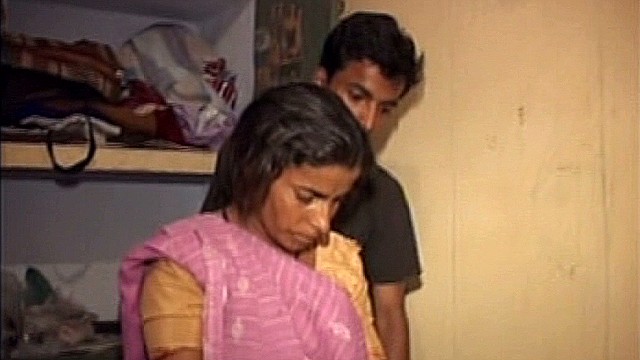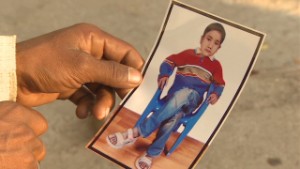On bail for 19 years, son born in jail works to raise $172 bond for mother
By Peter Shadbolt, CNN
updated 11:33 AM EDT, Thu May 30, 2013

Son works to bail mother out of jail
(CNN) -- In a story that could step straight from the pages of a Charles Dickens novel, an Indian son has worked night and day in a garment factory to earn the bail money to get his mother out of jail.
This month, after ceaseless work stitching in the textile factory, Kanhaiya Kumari, 19, raised the 5,000 rupees (about $89) needed pay his mother's surety.
His mother Vijaya Kumari, 48, was five months pregnant with Kanhaiya when she was arrested in 1993 in connection with the murder of a neighbor in India's Aligarh district, according to CNN affiliate IBN.
Sentenced to life in prison, she denied the charges and in 1994 she was granted bail pending her appeal, but her husband refused to post the Rs5,000 bail money.
"No one from my family or in-laws came to my help," she told CNN.

 India's missing children
India's missing children


 Hotels focus on traveling women
Hotels focus on traveling women



Acid attack victim: 'I had no hope'
Both mother and son remained in Nari Niketan prison in Lucknow, Uttar Pradesh, until Kanhaiya was sent to a juvenile remand home at the age of 6.
"I was very sad," Kanhaiya told CNN. "Without her, I had no one by me."
He was released last year after spending seven years separated from his mother and immediately set about getting a job that would pay for his mother's bail.
"He was out of work and couldn't make ends meet," said his employer AH Rehman. "He asked for a job that would provide him with some livelihood, so I got him a job in a ready-made garment shop."
Some 19 years after his mother was first jailed, Kanhaiya paid the bail money at Allahbad High Court and secured her release.
"I worked very, very hard to get the money for the release of my mother," he said. "I'm very happy now."
The case has prompted the High Court to take a closer look at the jails of Uttar Pradesh. The court has demanded a list of bailed inmates still languishing in jail.
India's courts are famously inefficient, with cases backed sometimes for decades. According to the Asian Human Rights Commission, confessions are the bedrock of India's criminal justice system making it notoriously difficult for courts to secure convictions.
The commission estimates the conviction rate for serious crimes is as low as 4 per cent of the cases that come before India's courts.
Indian acid attack victim fights for justice
By Peter Shadbolt, CNN
updated 11:33 AM EDT, Thu May 30, 2013

Son works to bail mother out of jail
(CNN) -- In a story that could step straight from the pages of a Charles Dickens novel, an Indian son has worked night and day in a garment factory to earn the bail money to get his mother out of jail.
This month, after ceaseless work stitching in the textile factory, Kanhaiya Kumari, 19, raised the 5,000 rupees (about $89) needed pay his mother's surety.
His mother Vijaya Kumari, 48, was five months pregnant with Kanhaiya when she was arrested in 1993 in connection with the murder of a neighbor in India's Aligarh district, according to CNN affiliate IBN.
Sentenced to life in prison, she denied the charges and in 1994 she was granted bail pending her appeal, but her husband refused to post the Rs5,000 bail money.
"No one from my family or in-laws came to my help," she told CNN.

 India's missing children
India's missing children 

 Hotels focus on traveling women
Hotels focus on traveling women 


Acid attack victim: 'I had no hope'
Both mother and son remained in Nari Niketan prison in Lucknow, Uttar Pradesh, until Kanhaiya was sent to a juvenile remand home at the age of 6.
"I was very sad," Kanhaiya told CNN. "Without her, I had no one by me."
He was released last year after spending seven years separated from his mother and immediately set about getting a job that would pay for his mother's bail.
"He was out of work and couldn't make ends meet," said his employer AH Rehman. "He asked for a job that would provide him with some livelihood, so I got him a job in a ready-made garment shop."
Some 19 years after his mother was first jailed, Kanhaiya paid the bail money at Allahbad High Court and secured her release.
"I worked very, very hard to get the money for the release of my mother," he said. "I'm very happy now."
The case has prompted the High Court to take a closer look at the jails of Uttar Pradesh. The court has demanded a list of bailed inmates still languishing in jail.
India's courts are famously inefficient, with cases backed sometimes for decades. According to the Asian Human Rights Commission, confessions are the bedrock of India's criminal justice system making it notoriously difficult for courts to secure convictions.
The commission estimates the conviction rate for serious crimes is as low as 4 per cent of the cases that come before India's courts.
Indian acid attack victim fights for justice


Comment